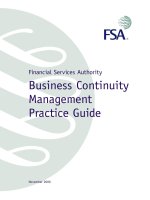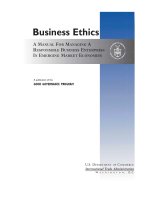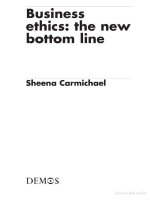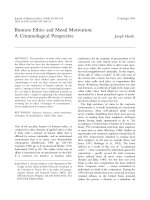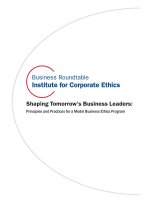BUsiness ethics as practice
Bạn đang xem bản rút gọn của tài liệu. Xem và tải ngay bản đầy đủ của tài liệu tại đây (1.49 MB, 322 trang )
This page intentionally left blank
Business Ethics as Practice
In recent years, a succession of corporate scandals has rocked the
international business community. As a result, many companies have
invested considerable time, money, and effort on the development of ethics
management programs. However, in many cases, such programs are nothing
more than insurance policies against corporate liability, designed merely to
limit the fallout of scandals should they occur. In Business Ethics as Practice,
Mollie Painter-Morland urges us to take business ethics seriously by
reconsidering the role of ethics management within organizations. She
redefines the typical seven-step ethics management program from within –
challenging the reader to reconsider what is possible within each aspect of
this process. In doing so, she draws on the insights of Aristotle, Nietzsche,
Heidegger, Foucault, and numerous contemporary organizational theorists
and sociologists to create the space for the emergence of a morally responsive
corporate ethos.
M O L L I E P A I N T E R - M O R L A N D is Associate Professor in the Department of
Philosophy at DePaul University, Chicago. She is also Associate Professor
in the Department of Philosophy at the University of Pretoria, South
Africa, where she was, for many years, Director of the Centre for Business
and Professional Ethics. In this capacity she acted as ethics management
consultant to various business corporations and the South African
government. In 2006, she was awarded an International Ethics Award by
the Society of Corporate Compliance and Ethics (SCCE) for her contributions to the ethics profession internationally.
Business, Value Creation, and Society
Series editors
R. Edward Freeman, University of Virginia
Stuart L. Hart, Cornell University and University of North Carolina
David Wheeler, Dalhousie University, Halifax
The purpose of this innovative series is to examine, from an international standpoint, the interaction of business and capitalism come to
be seen as social institutions that have a great impact on the welfare of
human society around the world. Issues such as globalization, environmentalism, information technology, the triumph of liberalism,
corporate governance, and business ethics all have the potential to
have major effects on our current models of the corporation and the
methods by which value is created, distributed, and sustained among
all stakeholders – customers, suppliers, employees, communities, and
financiers.
Published titles:
Fort Business, Integrity and Peace
Gomez & Korine, Entrepreneurs and Democracy
Forthcoming titles:
Crane, Matten & Moon, Corporations and Citizenship
Rivera, Business and Public Policy
Yajizi & Doh, Corporate Governance, NGOs and Corporations
Business Ethics as
Practice
Ethics as the Everyday Business of Business
MOLLIE PAINTER-MORLAND
CAMBRIDGE UNIVERSITY PRESS
Cambridge, New York, Melbourne, Madrid, Cape Town, Singapore, São Paulo
Cambridge University Press
The Edinburgh Building, Cambridge CB2 8RU, UK
Published in the United States of America by Cambridge University Press, New York
www.cambridge.org
Information on this title: www.cambridge.org/9780521877459
© Mollie Painter-Morland 2008
This publication is in copyright. Subject to statutory exception and to the
provision of relevant collective licensing agreements, no reproduction of any part
may take place without the written permission of Cambridge University Press.
First published in print format 2008
ISBN-13
978-0-511-45547-6
eBook (EBL)
ISBN-13
978-0-521-87745-9
hardback
Cambridge University Press has no responsibility for the persistence or accuracy
of urls for external or third-party internet websites referred to in this publication,
and does not guarantee that any content on such websites is, or will remain,
accurate or appropriate.
Contents
List of tables
page vi
Preface
vii
Foreword
xiii
Acknowledgements
xv
1
Introduction: the dissociation of ethics from practice
2
Reconsidering approaches to moral reasoning
50
3
Moral agency reconsidered
94
4
Reconsidering values
130
5
Leadership and accountability
179
6
Reconsidering ethics management
236
Index
1
293
v
Tables
1.1 Phases and elements of a typical ethics management
program
1.2 Limitations of ethics programs within organizations
6.1 A shift in assumptions regarding ethics programs
6.2 Redefining values
6.3 Ethics training from two perspectives
vi
page 7
47
239
258
273
Preface
Though all writing can be described as an attempt at conversation,
writing this book confronted me with the considerable challenge of
engaging in a conversation with a number of disparate audiences, each
with its own set of expectations and priorities. Academic writing is
always directed at one’s academic peers and senior students, but the
intended audience of this book also includes fellow consultants, and
those in the corporate and public sectors who are charged with ethics
and compliance programs. In fact, it is one of the primary objectives of
this text to engage this practitioner audience. However, having
emerged, as it has, not only from the experience of a consultant, but
also from the reflections of a philosopher, the text is informed by a
number of scholarly preoccupations and fascinations. To sustain this
kind of conversation required a delicate balancing act in which detailed
analysis had to be weighed against accessibility, philosophical interest
against immediate relevance, and the exploitation of existing literature
against the exploration of new ideas. As such, a certain degree of
compromise was both inevitable and unavoidable. I am not entirely
convinced that the right ‘‘balance’’ was always struck, but then,
finding ‘‘balance’’ would mean accepting the compromise, whereas
avoiding it means that the struggle continues.
The questions to which this text is a response originated in and
through my engagement with ethics management projects. This
exposure presented a much-needed reality-check to a young scholar,
eager to put into practice what she had the privilege of studying and
contemplating. I soon came to the sobering realization that many of
the well-reasoned theoretical constructs with which I set out did not
translate well to the messy realities of corporations and public service
departments with which I began grappling as a consultant. This may
not come as any great surprise to practitioners, nor, one suspects, to
some scholars. However, I remain convinced that in its various iterations, all philosophical ethics is concerned, informed and precipitated
vii
viii
Preface
by practice. As such, merely accepting that philosophical ethics does
not have much to say to business practice would undermine my
motivation for pursuing it in the first place. It is precisely the reintegration of theory with practice that this text seeks to accomplish. To
do so, I judged it necessary to make use of both philosophical insights
and multidisciplinary studies of organizational life. This hybrid
approach is likely to test some people’s endurance and I can only beg
the reader’s patience and indulgence in light of the objectives that I
have outlined above. I can only hope that the reader will become
convinced, as I am, of the necessity of the many ‘‘compromises,’’
‘‘translations’’ and ‘‘negotiations’’ that have shaped this text. For the
sake of better understanding and by way of preparation, I would like
to outline just a few of these.
Some practitioners may not be aware of this, but the philosophical
landscape is divided into distinct traditions. For instance, in the US,
there is a definite divide between so-called ‘‘analytic’’ and ‘‘continental’’
philosophical traditions. The differences between these traditions have
become so marked that analytic and continental philosophers do not
generally attend the same conferences, publish in the same journals, or
read one another’s work. The majority of business ethics scholars in the
US subscribe, either explicitly or implicitly, to the basic epistemological
suppositions of the analytic tradition. For me, this represents yet
another challenge in sustaining the kind of inclusive conversation that I
consider necessary in business ethics. I broadly describe myself as a
continental philosopher, at least in research interests and style, and
hence I often find myself having to ‘‘bridge the gap’’ between the two
traditions. At conferences and during peer review processes, I have to
‘‘translate’’ my ideas into terms that are more familiar and palatable
to my audience. To do so I am compelled to resist, as much as possible,
dwelling on the continental philosophers’ preoccupation with the
ineffability of experience and the hermeneutic complexity of representation and to try to convey my ideas in the sober, unembellished
prose and syllogistically precise logic that is valued in analytic scholarship. Though it is often challenging and uncomfortable, putting
oneself through the analytic ‘‘paces’’ makes one ‘‘multilingual’’ in a way
that fosters conversation. This book is another experiment in this
‘‘multilingualism,’’ drawing equally strongly on continental thought,
pragmatism, communitarianism and the work of some of my more
analytically inclined colleagues in business ethics.
Preface
ix
I suspect that many of my colleagues in continental philosophy will
wade through the corporate jargon and the data drawn from empirical
studies with great difficulty.1 Many of them will feel that the text could
have explored the philosophical traditions employed in far greater
detail, and described them in a more nuanced way. They would, of
course, be entirely correct. Others will wonder why I chose to accept
the terms within which ‘‘ethics’’ is pursued in the corporate environment so uncritically and why I did not level macro-economical
critiques against the broader capitalist regime. These would all have
been legitimate agendas, but they bring me back to what this book is. It
is an attempt at conversation, and as such, it requires accommodation
and translation. A certain measure of accommodation is indispensable
if the conversation through which the tensions between ethics as theory
and ethics as practice may be resolved is to be productively sustained.
It means that theory starts, and ends, in a situated practice, i.e. one
that is not only shaped and informed, but also bound, by the particulars of a specific material, temporal, and epistemological context.
Here I take the advice of those philosophers who would have us start
right where we are, in the here and now, in our own skin, and within
the parameters of whatever constraints we may presently be subject to.
From this perspective, it is our task is to try to ascertain who we are,
how we got to where we are, and how we may change where we are,
should that prove necessary.
If the book therefore reflects the conversations brought about by my
own particular philosophical identity, it is also significantly shaped
and informed by the unavoidable practical constraints to which business ethicists working in South Africa and the US are subject. As a
practical matter, business ethics is limited, in many respects, by a fairly
rigidly delineated and regulated set of organizational practices. This is
especially true in the US with its well-developed regulatory framework.
One of the practical implications of such a developed regulatory
environment is that legality often inadvertently becomes conflated with
morality in organizational practice. When and where this is the case, it
is something that may rightfully be bemoaned. However, it would
simply be impractical, at this particular historical juncture, to advocate
1
Not to mention the philosophical objections against such objectifying empirical
work and the critique of the power dynamics that inform its hypotheses!
Those philosophers who are driven up the wall by this kind of academic work
should scan – with forebearance – the last part of Chapter 1.
x
Preface
the abolition of an extensively entrenched regulatory system, such as
the one that exists in the US, on the basis of such an objection. The
truth is that with so many people so deeply invested in the idea, it
simply isn’t going to happen any time soon. This being the case, it is
perhaps more sensible to set our sights on, and invest our efforts in,
more realistically attainable goals – in other words, to play with the
cards that we have been dealt. I therefore chose to start the conversation right here, in the current reality of ethics officers and corporate
counsel – a context that is fraught with legislative demands and in which
liability threats abound. However problematic we may find this notion
from a philosophical point of view, the legal and regulative context
requires certain step-by-step ethics interventions, the ‘‘management’’ of
ethics, if you will. One can argue that ‘‘ethics management’’ undermines
the essence of what ethics is, and as this book will indicate, in some
respects I agree. But we still have to start right here, and reconsider the
practices that exist, in order to redefine ethics as such.
In the process of reconsidering established corporate ethics management practices, I also have to beg the patience of my practitioner
audience, who may feel that I really did not need that much philosophical justification to make my point. Such objections are certainly
understandable, but this book is also an attempt to involve my
graduate students and my colleagues in a conversation (there are, of
course, many others) that I truly believe makes what we do in philosophy
exciting. It wants to restore us to our role as public intellectuals
who care deeply about the realities navigated by those without the
luxury of living primarily as readers, writers and teachers. The role of
public intellectuals relies on the ability, and willingness, of both
audiences to translate. Practitioners have to share their questions, and
their answers, and scholars have to relate their insights into how the
history of thought informs our options in the present and in the future.
This is no simple task, as many of the thinkers whose ideas still inform
our presuppositions and prejudices in the present lived in completely
different times, and as such could not possibly have anticipated the
contemporary relevance of their proposals. Yet there is so much to be
gained from knowing where our understanding of ourselves and our
beliefs comes from. It provides us with the kind of perspective that is
necessary to effect change.
In this text, certain chapters are more deliberately focused on providing the philosophical background to why we do things in particular
Preface
xi
ways in ethics. They try to explain why and how certain assumptions
prevent us from exploring rewarding new avenues of thought and
practice. I leave it up to my practitioner readers to decide whether they
want to accompany me on this part of the journey. For instance,
Chapter 2 provides a detailed analysis and critique of some of the most
prevalent approaches to ethical decision making, which may be of
interest to some practitioners, especially those involved in designing
ethics training programs, but certainly not to all. Chapter 3 makes a
case for the need to rethink who we are as moral agents on the basis of
a number of philosophical considerations. Managers and executives
who are not interested in exploring these issues in such philosophical
depth may simply scan Chapters 2 and 3 without fear of losing the
thread of the overall argument.
In each conversation, some common ground has to be established,
and in this text, I suspect that Chapter 4 is it. It contains a lot of
philosophical analysis, but it employs these perspectives to redefine
values in a very practical sense. I would therefore suggest that
regardless of what the reader’s specific reason for picking up this text
is, he/she would need to read this chapter as conceptual framework for
the propositions put forward in the last part of the book. It lays out the
basis of a new epistemology, advocates a new understanding of what
business is about, redefines what values are, and ultimately what
business ethics could be.
The book ends with practice, as I think all books should. Chapters 5
and 6 explain why we may need to rethink leadership and ‘‘ethics
management.’’ In following the broad argument of the book up to
this point, as well as the various observations offered along the way, it
may be possible for some readers to conclude that all the elements of
ethics management programs are best abandoned. However, I deliberately chose not to go that route. I believe that changes to practice
occur incrementally. From the perspective of complex adaptive systems, small changes can have large effects. If you tinker with enough
elements in the system, new patterns emerge. But you have to tinker
often, and insistently. It is the initiation of such a process to which this
book aspires.
The arguments and observations offered here potentially have many
other applications, but the focus of this book is on rethinking ethics
management. I have focused in this text on the practice of which I have
had the most experience, and for the moment it ends there. But this
xii
Preface
ending opens many other avenues, which I hope to explore in future
projects. However, for that research to happen, the places, people and
problematic conversations that will shape and inform it are yet to
announce themselves with sufficient immanent force. In a sense, I have
no choice but to wait patiently until they do, because to me, it is this
that makes ethics as practice possible.
Foreword
Mollie Painter-Morland has written an important book. It charts a
new direction for business ethics as a discipline along a number of
dimensions. First of all the book introduces more of the continental
and post-modern traditions to the largely Anglo-American conversation about business ethics. Second, this is accomplished by paying
attention to the practical problems of ethics in modern organizational
life. Third, by merging theory and practice, Painter-Morland offers us
real wisdom about how to think about ethics in corporate life.
Professor Painter-Morland begins by arguing that most of our
thinking about ethics has become disconnected with the practical
problems that we face in our lives. And nowhere is this clearer than in
business, where the scandal of the day seems to drive the analysis of most
philosophers, who simply conclude that people need to be more ethical.
Typically they mean by this phrase, ‘‘become more in tune with the tenets
of Anglo-American ethical theory.’’ She rightly claims that ‘‘business
ethics is supposed to be as much about business as ethics,’’ but shows us
how the kinds of narratives that are present in the current business ethics
conversation can never really be about business. And she eschews the idea
that ethics can be built into business practice through the traditional
means of ethics officers and codes of principles and behaviors.
What Painter-Morland offers in the place of this tradition is a view of
business ethics that does not make the theory–practice distinction, but
rather is grounded in practice. It is a view that puts questions such as
‘‘how should we live’’ and ‘‘who am I and what kinds of relationships
with others are possible’’ squarely in center stage. She makes it
abundantly clear that in the traditions on which she draws, ‘‘there is a
general acknowledgement and appreciation, . . . of the role that people’s
emotions, bodies, relationships, histories and contexts play in shaping
one’s sense of self, and any perceptions and beliefs that one may have.’’
After opening chapters which set the stage for her new approach, we
find concrete discussions of the role of context and relationships in
xiii
xiv
Foreword
business, the nature of moral values and their place in an epistemology
that is skeptical of the tradition of moral reasoning and the search for
normative certainty and foundations.
Nietzsche, Heidegger, Lakoff and Johnson, Young, Nussbaum,
Bourdieu, Polanyi, Marcuse, Butler, Merleau-Ponty and others join the
conversation about the connection between business and ethics. We find
topics like authenticity, sexuality, gender, power and domination,
embodiment, and others alongside management theory, stakeholders,
rights, leadership, and decision making. What holds the conversation
together is its profound concern with the practical Socratic question of
how should we live.
Business ethics as a discipline is in danger of becoming irrelevant. It
has held onto its foundational roots for too long. As others discover
the power of thinking about values and ethics in business, the role of
philosophers, mired in traditional ethics, will become increasingly
marginal. Painter-Morland offers hope to philosophers working in
business ethics, and she offers a sound philosophical roadmap to those
in business schools who find the current landscape problematic.
By integrating the work done in continental philosophy, traditional
business ethics, and management theory, Painter-Morland gives us a
multi-layered argument that should set a new direction for the
conversation about business and its role in society. Indeed it is an
honor to publish this book in the series on Business, Value Creation,
and Society. The purpose of this series is to stimulate new thinking
about value creation and trade, and its role in the world of the twentyfirst century. Our old models and ideas simply are not appropriate in
the ‘‘24/7 Flat World’’ of today. We need new scholarship that builds
on these past understandings, yet offers the alternative of a world of
hope, freedom, and human flourishing. Mollie Painter-Morland has
given us just such a book. She has breathed new life into business
ethics.
R. Edward Freeman
Olsson Professor of Business Administration
Academic Director, Business Roundtable
Institute for Corporate Ethics
The Darden School
University of Virginia
Charlottesville, Virginia, USA
Acknowledgements
So many people, places and experiences contributed to the conversation
that takes shape in this book. Naming them is a daunting task and
thanking everyone who has somehow helped me along the way is
simply not possible. In some respects this book is the culmination of a
journey that started a number of years ago, and as I retrace my steps
over the past seven years, scores of faces drift into focus.
My journey in Business Ethics started during my time as a PhD
research scholar on a Fulbright grant at the Center for Business
Ethics at Bentley College in 2000–2001. I cannot give enough credit
to Professor W. Michael Hoffman, and his wonderful team of people,
for the support, resources, and companionship they offered me
during my stay in Boston. The time I spent at the CBE provided me
with the best possible exposure to best practice in ethics management.
The Ethics Officer Association (now ECOA) under the leadership of
Ed Petry was also instrumental in exposing me to the practical rollout of ethics management programs. I learnt a great deal from
practitioners within the ECOA and Society of Corporate Compliance
and Ethics (SCCE) and I continue to do so.
Many decision-makers and mentors at the University of Pretoria
deserve thanks for the trust they put in me by appointing me as
Director of the Centre for Business and Professional Ethics upon my
return to South Africa in 2001. This position gave me the opportunity
to gain consulting experience in both the South African public and
private sectors. Thrown in at the deep end, I was fortunate enough to
have had wonderful clients, who learnt with me, debated the issues
with me, and believed in me. I owe so much to their practical advice,
experience and dedication. The dilemmas we confronted together
informed the questions that led to this book. I hope that my new ideas
and proposals will enhance their programs and will stimulate further
conversation between us. I also want to thank some of the consultants
who partnered with me on large projects, especially Deon Rossouw,
xv
xvi
Acknowledgements
Kris Dobie, Stiaan van der Merwe, John Mafunisa, and Leon van
Vuuren for their loyalty, conversation and perspective.
The University of Pretoria deserves thanks for appointing me to a
challenging position early on and then being gracious in allowing me
some focused research time when I needed it most. My research leave
greatly contributed to bringing this book project to fruition. Their
support since my move to DePaul University has remained unfaltering,
and I continue to work with the Centre for Business and Professional
Ethics (CBPE) and the Philosophy Department there on a part-time
basis.
My current institutional home has been the perfect base from which
to further my research. Not only did DePaul University support my
research through a Summer grant, but it is also an institution that has
become well-known for its wealth of Business Ethics expertise. I was
fortunate to have two of the strongest women in the field, Patricia
Werhane and Laura Hartman as colleagues and friends. This was not
the full extent of my good fortune however. DePaul University’s
Department of Philosophy provided me with the collegial environment
that any philosopher could only dream of. Not only did I have access
to some of the best minds in continental thought, but I was offered the
friendship and moral support of an amazing group of people. Nothing
inspires writing more than that. I often found myself exploring new
research ideas during happy hour-long conversations with Peg
Birmingham, Tina Chanter, Jason Hill, Sean Kirkland, Rick Lee,
Bill Martin, Will McNeil, Darrell Moore, Michael Naas, David
Pellauer, Franklin Perkins and Peter Steeves. A special word of thanks
goes to my friend and colleague Elizabeth Rottenberg for her wisdom
and much needed perspective. David Krell has been a pillar of support
since my arrival at DePaul and was gracious enough to comment on
this book and to provide generous proofreading assistance. He, more
than anyone, buttresses my faith in the power and value of conversations
and collaborations. I also owe immense gratitude to Edward Freeman,
who has supported this project since its inception and never ceases to
inspire me through the way in which he lives the academic life.
I am in the fortunate position to have been brought up as someone
who thrives on conversation, debate, and mediation. For that, I have
my father, mother and my two brothers to thank. Submitting to the
force of the better argument has never come easy for any of us, but, as
I have come to appreciate from an early age, it has its own worthy
Acknowledgements
xvii
rewards. To a great extent this exposure to the cut and thrust of the
debate made me and continues to make me who I am, and informs
everything I do and write.
I am particularly grateful to my husband, Arno Morland, who has
had to live with the anxieties that my multiple conversations precipitate,
and continues to love and support me regardless. He is the one person
who has read every single word I have ever written. He is also someone
who believes that there is no formulation that is beyond improvement.
As such, he has inspired me to work even harder at conveying my
thoughts in writing. As language editor of this book, he smoothed out
many of the rough patches that is the inevitable consequence of my
simultaneous participation in so many widely disparate conversations.
For his hours of work and his tenacious support I can never thank
him. For who and what he is I do love him and dedicate this book to
him.
1
Introduction: the dissociation of
ethics from practice
Ethics talk has never been more prevalent than in the first few years of the
twenty-first century. Corporate scandals have shaken the international
business community over the last few years and seem to have reanimated
many people’s interest in ethics. As a result, codes of conduct, ethics
management programs and ethics offices are being created with breathless
haste. Even skeptical corporate executives are beginning to acknowledge
that there may be more to ethics than “motherhood and apple pie.” Many
have even come around to the idea that ethics is something that has to be
institutionalized, resourced and managed. To the extent therefore that
they are interested in keeping their organizations out of trouble and
limiting their potential liabilities, these “upright” captains of industry
now stand ready to invest time, effort and money in the promotion of
ethics. In the face of this wave of unprecedented interest, many business
ethicists have concluded that the business community no longer sees
business ethics as an oxymoron. In fact, an investment in business ethics
has become a prerequisite for an organization’s continued participation in
formal business networks.
Given these conditions, one would expect this to be a good time to be a
business ethicist. In some respects, however, it is both the best of times and
the worst of times. It is the best of times in that business ethics and corporate governance are becoming standard features in both tertiary curricula and corporate training budgets. All of a sudden, everyone seems to
have awoken to the importance of teaching people ethics. The assumption
is that teaching ethics builds integrity, encourages responsible behavior,
and generally puts moral considerations on the business agenda. There are
also benefits, such as enhanced employee morale, lower staff turnover, and
enhanced corporate reputations that are associated with ethics training.
In other respects, however, this is the very worst of times for business
ethics. Many corporate ethics programs have become no more than
“insurance policies” against corporate liability and are implemented and
managed with an indiscriminate “checkbox” mentality. Having an
1
2
Business Ethics as Practice
organizational ethics program is begrudgingly accepted as a “musthave” check on business practices. As such, it is conceived of as something quite separate from what business is actually focused on. In fact,
such consideration as ethics does receive is perceived as time spent on
“soft issues,” i.e. matters that distract from “business as usual.”
The approach to business ethics that is currently being extolled in
many business and academic forums may implicitly be contributing to
the dissociation of ethics with business practice. Ethics is portrayed as a
set of principles that must be applied to business decisions. In this conception, ethics functions as a final hurdle in a deliberate decision-making
process. The questions that inform this process are usually something
along the line of: “May we do this?” or even more cynically: “Can we get
away with this?” When approached in this way, ethics becomes something that people consider after they have interpreted events and determined what they want to do. When ethics functions as an integral part of
business practice, however, it informs individuals’ perceptions of events
from the start and plays an important part in shaping their responses.
This kind of ethics is not based on the deliberate application of general
principles, but draws instead on tacit knowledge and individual discretion. The kinds of questions that ethics as practice would have us ask are
of a decidedly different order. It asks us to consider: “How do we want to
live?” and: “Who do we want to be?” When an organization’s investment in business ethics becomes a mere insurance policy, really meaningful and significant questions such as these are never raised or
addressed.
In itself, the claim that ethics and business practice are becoming
dissociated may not seem particularly controversial. There are many
business ethicists who would not only readily agree that such a thing is
happening, but would also welcome it. Some would argue that ethics as
practice is disappearing because it is an outdated notion. It is true, of
course, that the association of ethics with practice is a very old idea. It is
based on the ancient Greek concept of phronesis, or practical wisdom.
Those who are critical of this view argue that it is more suited to the kind
of small, ancient communities within which it was conceived than the
complex contemporary world that we now inhabit. To think of ethics as
part of everyday practice, they argue, is to associate it too closely with the
“messiness” of individual perception and contextual biases. It simply
allows individuals too much discretion to ensure the orderly conduct of
business. In small communities, where individuals knew one another
Dissociation of ethics from practice
3
personally, such trust may have been possible. However, within the
context of an impersonal global economy, we need something more solid
and reliable to protect our interests. In contemporary business and
society, it is only the law that can ensure responsible behavior. Those
who subscribe to this line of reasoning therefore invariably turn to
stricter legislation, more exacting compliance measures and the threat of
imprisonment to keep business practitioners in line.
Despite its widespread implementation, this legislative approach does
not seem to be working as well as its proponents might have hoped.
News of fresh business scandals continues to arrive at our doorsteps
almost every morning. Judged on the basis of their performance, then,
rules and legislation alone appear to be poor substitutes for the kind of
practical wisdom that is inscribed in the notion of ethics as practice. In
fact, efforts to formulate unambiguous normative guidelines for the
conduct of business may paradoxically cause us to neglect those very
aspects of human life that both legality and morality attempt to protect.
Both legality and morality are concerned with establishing criteria for
acceptable behavior. Both make these judgments on the basis of existing
social norms and values. These norms and values are expressions of those
things that the members of a particular community consider important
enough to protect and nurture. The protection of our lives and property,
for instance, is guaranteed by law. Naturally these primary security
needs are exceptionally important, but there are things that speak to the
very core of our self-understanding as human beings that we don’t
necessarily want to secure through legislation or regulation. Consider,
for instance, the implications of legally enforcing things like fidelity,
trust, responsibility and care. The world would be a sad place indeed if
we felt compelled to adopt a law to ensure that friends cared for one
another and trusted each other. However, it would be an even sadder
place if we didn’t think these things important at all. Ethics is, in a sense,
the practice of such things in everyday life.
Ethics in business is about the capacity to respond appropriately to the
many competing pressures and expectations that push and pull individuals in the course of their daily participation in complex organizational and business networks. It requires an intuitive and continuous
balancing act, in which an individual’s character, values, and relationships all register in significant ways. This is precisely why the law cannot
adequately serve ethics as practice. Practical wisdom is not simply the
ability to identify and apply relevant rules. It is the capacity to make
4
Business Ethics as Practice
decisions in situations where there are no regulatory parameters to defer
to, or where the rules are of such an imprecise, ambiguous nature that
they require the exercise of discretion. To act with this kind of wisdom is
simultaneously to be responsive to others, true to oneself and decisive in
the absence of certainty. As such, it is not dissimilar to the kind of insight
and skill that is required for any important practical decision in today’s
complex business environment.
Business ethics is supposed to be as much about business as it is about
ethics. As self-evident as this may seem, business ethicists are often guilty
of not paying enough heed to the complex dynamics of contemporary
business life in the way that they approach the subject. This may be due, at
least in part, to the fact that many still subscribe to the view that normative imperatives should be unchanging, irrefutable standards that
define what is acceptable in business behavior. Morality, from this perspective, should be defined “objectively.” That is to say that moral imperatives have to be articulated independently from the pressures and
expectations that inform people’s experiences and perceptions in particular situations, relationships and contexts. Proponents of this view
believe that it is only once normative imperatives have been formulated in
this way that they can be brought into relation with, or “applied,” to
specific cases. It is not hard to see why so many people continue to think
this way about morality. We prefer not to have the messiness of the real
world interfere with our sense of “right” and “wrong.” To have to constantly rethink or renegotiate those norms on which we rely for guidance
is disorientating and undermines our sense of certainty. It seems to open a
door to the kind of relativism and moral subjectivism that renders ethics
meaningless. It is tragic to note, however, that, because of our lack of
nerve, the kind of moral responsiveness and personal discretion that is
such a key feature of ethics as practice is slowly and systematically being
suppressed in business life. While some business ethicists have been
occupying themselves at the top of their academic ivory towers with the
philosophical reinforcement of ostensibly immutable normative principles, those who make their living in the corporate jungle around them
are making up their own rules for the game. If business ethicists are unable
to appreciate this game, and are unable to participate in the dynamics that
shape business practitioners’ moral sensibilities, the association of ethics
with practice will continue to weaken until it effectively ceases to exist.
The tendency to dissociate ethics with particular situated practices
often undermines the meaningfulness of business ethics interventions.
Dissociation of ethics from practice
5
Business ethicists who support the abstraction and generalization of
ethical imperatives often develop standardized ethics management
models that are intended to serve as a vehicle for interventions in any
organization. However, because it is mostly large corporations that can
afford to implement such models, they are often designed with these
organizations in mind. In the process, not enough consideration is given
to the fact that small and medium-sized businesses, as well as “not-forprofit” organizations often do not have the resources to implement and
manage such programs. These enterprises are simply left to forge ahead
without much attention to the moral dimensions of their business
practices. A tacit sense of normative propriety nevertheless develops
among the employees of such organizations and as they grow and
expand it becomes increasingly difficult to change or alter entrenched
perceptions and expectations.
In addition, pre-packaged business ethics strategies often rely on the
institutionalization of standardized codes and compliance procedures.
These codes and procedures are not tailored to reflect the unique sensibilities that may have developed within a particular organization or the
expectations and dynamics that exist within specific industries. This
limits their relevance and ability to effect change.
There are many who believe that ethics officers and ethics offices
play an important role in making ethics a central concern amongst an
organization’s workforce, but often little consideration is given to how
a small minority of individuals are supposed to shape and transform the
cultural dynamics of a complex organizational system. Ethics surveys
and climate studies are regularly employed, but are mostly incapable of
detecting or describing the tacit, unwritten rules that are the primary
source of moral orientation in many organizations. No expense is
spared in the internal communication of an organization’s moral
commitments and ethical standards, but these efforts often do little to
change the perception among ordinary employees that ethics is simply
the latest in a succession of temporary management obsessions. In
ethics training initiatives employees are taught to use ethics “quick
tests.” Case study analyses are employed to hone the moral reasoning
skills of workers who are unlikely to be given sufficient discretionary
freedom to use them.
In all of this, individuals are never asked to reconsider fundamentally
who they are, what they really care about, and how they can leverage
these beliefs to make their workplace a better environment.
